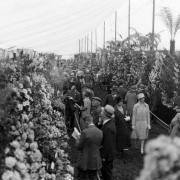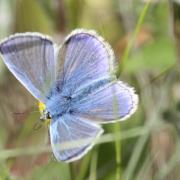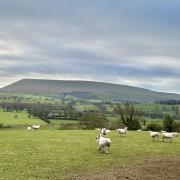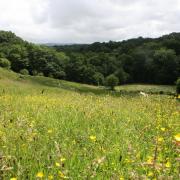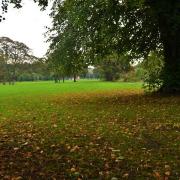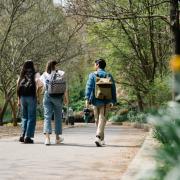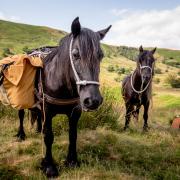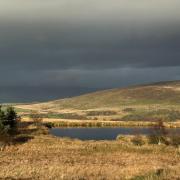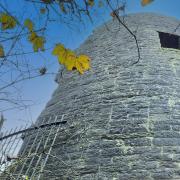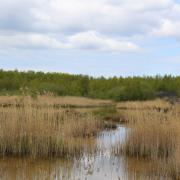Emma Mayoh tries out one of Britain's most unusual weekend destinations with nothing but a shepherd's hut for shelter PHOTOGRAPHY BY KIRSTY THOMPSON
Arrange your own visit
The cost of a stay at Scales Plantation starts at �65 for one night. A welcome pack full of food produced locally is included as are all the essentials you will need, including towels, kitchen equipment and firewood.
Additional food can be supplied from a local farm shop by posting your order in a post box on the camp. One hut sleeps four people with one double bed and a bunk bed. For more information or to book visit www.canopyandstars.co.uk/findaplace/scalesplantation
Tell us about any unusual holidays you have had or your favourite place to stay in Lancashire or the Lake District at letters@lancashirelife.co.uk or leave a comment
As alarm calls go, it’s got to be up there with the more unusual. As a helicopter circled overhead I could hear the echoing scream of a man nearby. Given the fact I was in the middle of dense woodland in the North Lakes countryside, I thought it would be best to investigate.
Fortunately, just before I lurched into the surrounding wilderness, I saw hundreds of sheep obediently being rounded up. The cries had been from a local shepherd and the chopper just happened to be passing.
The only instruction before arriving at Scales Plantation, a shepherd’shut camp in a rural idyll between Keswick and Penrith, was to bring a torch. It isn’t on the usual list of essentials for a weekend away but it was, apparently, a must.
In the days leading up to my stay, several friends rubbed their hands together with glee as predictions of sub zero temperatures and snow dominated the forecasts. They got their wish. The temperature gauge was teetering on minus four when I pulled up outside the Blencathra camp.
When I turned off my headlights the need for a torch became abundantly clear. Despite being just a few steps ahead of me, the hut I would be sleeping in that night was nowhere to be seen.
I’ll admit I was nervous. I’ve always been a bit of an armchair adventurer than a Challenge Anneka. Any camping I’ve done has been out of necessity rather than desire.
But Scales Plantation is a place like no other. Don’t be fooled by the exterior of the hut. Inside it is pure luxury. Fluffy feather down duvets, sheepskins and a wood-burner provide a comfort exceeding some hotels.
The kitchen and bathroom, located in a separate timber building, were equipped with hot running water and a woodburning range to cook on. There was also a separate loo and, for the adventurous, an open pit to cook on.
The huts were originally designed for shepherds to tend their flock and to provide them with shelter. Thankfully, while I was there, there were no shepherding duties. However, there was plenty of floundering around in the dark as I tried to accustom myself to my new surroundings.
It has been the task of husband and wife, Tabitha and Rob Wilson, to build this rural delight. The couple, who also run an upland beef and sheep farm adjacent to Scales Plantation in Berrier, decided they wanted to make the most of the woodland on their land. They are passionate about the surrounding countryside and were keen to share it with others. They needed to be.
It has taken a lot of back-breaking work to get their first shepherd’s hut up and running - with lots more still to do as they continue work on other camps due to be up an running later this year. But before they could even think about building they had to clear roads, paths and areas that travel through the dense woodland. Tabitha said you could see no further than a few metres.
They did it using nothing but a measuring tape and a piece of string to find out the lay of the land - GPS doesn’t work in a place as remote as this. It was something that took months, with the help of their three sons who now prefer to eat breakfast at the camp than in their own home. By thinning the woods they also hope to allow the local wildlife, including the local red squirrels and roe deer, to flourish.
The couple have put in the hard work so their paying guests don’t have to and they have done it with the environment in mind. Solar packs provide electricity for the camp, a wood fire powers the oven, they encourage you to recycle � as much as possible, the loo is self-composting and even the toiletries in the bathroom are green.
The camp’s eco-credentials haven’t sacrificed the feel of the place though. You still have hot water, you can keep warm with the wood-burners and the views of nearby Skiddaw, Bowscale Fell and Carrock and the canopy of that can be seen without the interruption of light pollution, are unbeatable.
When I had first arrived at the camp I was shown around by Tabitha and son, Ben, who was full of excitement at being at the hut - his mum had to explain that sometimes he has to share it with other people. But it iseasy to join his excitement.
What this family have created is quite remarkable. As clich�d as it sounds it isn’t until you step away from the routine and luxury of everyday life that you realise you could happily live without it. The only sound in thatwild countryside was the t’wit t’woo of nearby owls, as well as that local shepherd, of course.
Our breakfast of bacon butties, provided in the welcome pack full of local sourced treats and essentials, were cooked on the wood-burning range and our evening meal was done in the outdoor fire pit, despite the snow.
It might have been something that caused great delight to people who, before I went there, laughed at the prospect of me being stranded in the wilderness. But I’m pleased to report, I had the last laugh.



